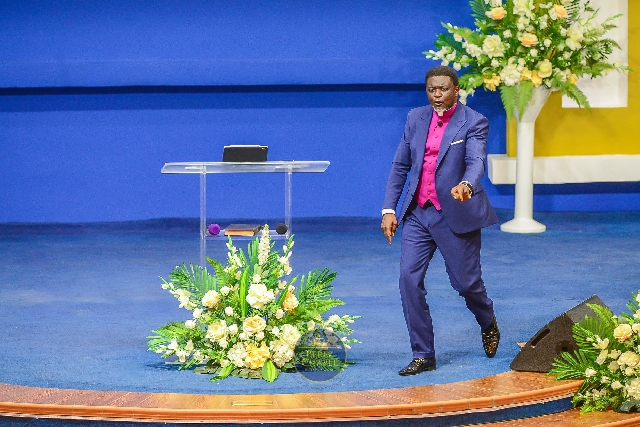Galamsey: 'Our land mourning' – Agyinsare calls out complicit 'money-loving, corrupt' politicians, chiefs; rallies Christians 'to shine light' on canker, and says: 'We can't all shut up!'
 Archbishop Charles Agyinasare
Archbishop Charles Agyinasare
Archbishop Charles Agyinasare has said the land of Ghana is mourning because of the destructive practices of illegal mining (galamsey).
In a sermon on Sunday, 8 September 2024 titled: ‘Restoring Our Land: A Call Against Galamsey,’ Dr Agyinasare noted: “Galamsey is an issue that threatens our environment, our health, and our future,” stressing: “It is a pressing issue that is affecting our beloved nation,” thus, “As a preacher, I must be concerned with what is happening around me,” just as the Apostle Paul did in his day, according to Acts 17:23 NKJV: “For as I was passing through and considering the objects of your worship, I even found an altar with this inscription: To the unknown god. Therefore, the one whom you worship without knowing, Him I proclaim to you.”
Illegal miners, Dr Agyinasare explained, employ methods such as panning (washing soil and gravel in water to separate gold particles), sluicing (using water to wash away soil and concentrate minerals in a trough) and using mercury to amalgamate gold.
Turning to the Bible to illustrate man’s role as “stewards of God’s creation,” Archbishop Agyinasare quoted Genesis 2:8, 15 NKJV, to make the point: “The Lord God planted a garden eastward in Eden, and there He put the man whom He had formed. Then the Lord God took the man and put him in the Garden of Eden to tend and keep it.”
Also, he said Psalm 104 describes the beauty of God’s creation.
Caring for the environment, therefore, the Archbishop noted, is “a sacred responsibility that each of us bears as followers of Christ: the stewardship of God’s creation. From the majestic mountains to the tiniest creatures, all of creation is a testament to God’s glory and love.”
He said in the book of Proverbs 12:10 (NIV), humankind is reminded: “The righteous care for the needs of their animals, but the kindest acts of the wicked are cruel.”
“This verse highlights the importance of stewardship over God’s creation, which is being compromised by these illegal activities,” Dr Agyinasare observed, as he screened to the congregation, videos of fish suffocating in water bodies devastated by galamsey.
Galamsey, he noted, “is prevalent in several regions across Ghana, particularly in the Ashanti, Western, and Eastern regions. Amazingly when I went up north, I discovered that it started happening in the North, too.”
Rivers such as the Pra, Ankobra, and Offin are “significantly impacted,” he pointed to the videos, as he showed the congregation what these rivers looked like before and after galamsey.
Before galamsey devastated these rivers, Dr Agyinasare said the Pra, for instance, was so clear that one could “easily fetch” from it to drink but that is not the situation anymore.
The same can be said of the Ankobra and Pra.
He bemoaned that instead of “filling the earth and subduing it,” as God commanded man to do in Genesis 1:28 (NIV), humankind is rather destroying it. “We are called to be caretakers of the earth, yet galamsey leads to the degradation of our lands and water bodies, contradicting this divine mandate,” Dr Agyinasare pointed out.
In his view, poverty, unemployment and the get-rich-quick mentality are the “root causes of galamsey.”
“Many individuals turn to illegal mining as a means of survival,” the preacher noted.
He mentioned, also that the “insatiable desire for wealth drives many to engage in destructive practices, often at the expense of their communities and the environment,” as written in Ecclesiastes 5:9-10 NKJV: “Moreover the profit of the land is for all; even the king is served from the field. He who loves silver will not be satisfied with silver; nor he who loves abundance, with increase. This also is vanity.”
He showed a video to the congregation which captured people “running” and “rushing” to do galamsey in “your country.”
Additionally, Archbishop Agyinasare quoted the Ghana Minerals Commission as acknowledging in 2020 that: “Weak Regulatory framework – the lack of effective regulation and enforcement of mining laws, contributes to the persistence of galamsey.”
Archbishop Agyinasare, however, was quick to point out that: “Mining is not bad,” noting: “There are people who are not illegal miners. They are given licences to mine. We must encourage such, but the illegal mining, we must stop.”
Apart from the aforementioned factors, he identified corruption and lack of political will as critical drivers of galamsey, too, saying: “Without strong enforcement mechanisms, illegal miners operate with impunity.”
Archbishop Agyinasare also quoted the scholarly works of (Amoako, 2021), in acknowledging that galamsey is a way of life for some communities, thus, its prevalence.
“In some communities, mining is viewed as a legitimate means of income, and individuals may be encouraged to participate in illegal activities. Additionally, social networks often support and facilitate illegal mining, creating a culture of acceptance around galamsey operations.”
He also quoted scholarly works that point accusing fingers at traditional and political leaders in festering the menace.
“The involvement of chiefs and politicians in illegal mining, or galamsey, in Ghana, is a significant concern that has been documented in various studies and reports. Local chiefs often play a crucial role in the management of land and natural resources in Ghana. Some reports suggest that they may be complicit in illegal mining activities due to financial incentives or pressure from local communities seeking economic opportunities,” said Dr Agyinasare, referencing Amoako (2021) as highlighting the complex relationship between traditional authorities and illegal mining, suggesting that some chiefs may benefit from the economic gains of galamsey operations.
Archbishop Agyinasare noted that “community members often express frustration over the role of local leaders in perpetuating illegal mining,” as: “Many believe that chiefs and politicians prioritise short-term financial gains over the long-term health of the environment and community welfare.”
“I was talking to somebody who is also a politician and he said: ‘You can’t believe the number of politicians who are engaged in galamsey. You can’t believe it. And, we heard the Asantehene, Otumfuo himself say that: ‘Many chiefs in Ghana are engaged in galamsey and they are not just saying it. The United Nations Environmental Protection Unit (UNEP) has said that and it is documented. That’s why I gave you the dates.”
He also made reference to a research by Hilson (2020) on the subject matter, in which the scholar demonstrates the nexus between political corruption and galamsey where the complicity of political actors undermines efforts to combat the crime.
“Political figures in Ghana have been accused of turning a blind eye to illegal mining activities or even facilitating them for personal gain. This has raised concerns about corruption and the effectiveness of governance in managing natural resources.”
“And because of that, our politicians – whether NPP or NDC – lack the political will to stop galamsey. May God help us so that our politicians will look at the land and look at how things are going and change the trajectory we are going on,” Dr Agyinasare said.
The consequences of galamsey, Dr Agyinasare noted, are devastating, as alluded to by the works of Diarra et al. (2020), which provide insights into how local leaders’ decisions impact environmental sustainability and community well-being in Mali, a situation with striking relevance to the galamsey problem in Ghana.
“The actions of chiefs and politicians in relation to Galamsey have severe implications for environmental degradation and social conflict. Their involvement can exacerbate the negative effects of illegal mining on communities and natural resources.”
Dr Agyinasare also cited the World Bank (2021) on the challenges faced by the Ghanaian government in effectively regulating the mining sector, particularly the influence of local elites, including chiefs and politicians, on illegal mining activities.
“Efforts by the Ghanaian government to clamp down on illegal mining have often been undermined by the influence of chiefs and politicians. This has led to a cycle of ineffective governance and continued environmental degradation.”
Galamsey, Dr Agyinasare noted, “Often occurs in the shadows, under the cover of night, or during times of lax enforcement of environmental laws. It is a continuous cycle that can happen at any time, driven by the greed and desperation of individuals,” citing: “In John 3:19 (NIV), we are reminded, ‘this is the verdict: Light has come into the world, but people loved darkness instead of light because their deeds were evil.’”
“That is why you and I must shine light on the galamsey menace. We must bring this issue into the light and confront it with truth and justice. We can’t pretend it is not happening,” he declared, adding: “The consequences of galamsey are dire. It leads to environmental degradation, loss of biodiversity, and pollution of our water bodies. Rivers and water bodies are particularly vulnerable to the impacts of galamsey. The use of toxic chemicals in mining processes leads posing severe health risks not only to the miners (neurological, respiratory problems and kidney damage) and surrounding communities (UNEP, 2021).”
“As I studied, I found out that they are proving that a lot of the people who do the galamsey, with time they start having neurological problems and this has been proven by the UNEPA in their 2021 report. They are having respiratory problems, breathing problems. They are beginning to have kidney damage and it is beginning to affect the surrounding communities. The galamsey is creating water pollution, affecting aquatic life and the health of communities that rely on these water sources. The contamination of our water bodies is posing a significant risk to public health. Look at the water this village is drinking (pointing to the screen) – and this used to be clear water. This used to be clean water and they are drinking this water.”
Recently, Archbishop Agyinasare recalled, “They took samples of water in bottles. They had the before and the now and when you look at the samples of the water we have, very soon, we won’t even have water to drink because the mercury and the chemicals they use in galamsey seep into the soil and if we don’t do something about it, very soon water that our parents could easily fetch and drink at the riverside, we’ll have to be importing it. We would have to import pure water from overseas because the water that will go into our water treatment plants will be so saturated with chemicals because the chemicals to purify it would be so much that we can’t even be able to drink it. By the time you are drinking water that has been bottled in this country, you would be killing yourself. May God give us the political will and the strength and as citizens, may we be able to confront these things.”
Also, it causes water pollution, which affects aquatic life and the health of communities that rely on these water sources. “The contamination of water bodies poses significant risks to public health, as many communities depend on these sources for drinking water (UNEP, 2021) in Ghana.”
“One of the videos I saw that broke my heart is that because of galamsey, our fish are even dying and the guys [galamseyers] are fetching the water from the river and re-directing it somewhere, so, the fish are choking and can’t swim anymore. And if you talk about it, they say you’re being political. I’m not being political. There’s not politics in this. There’s nowhere we can go,” Dr Agyinasare warned.
He referenced a report by Myjoyonlince.com dated 7 September 2024, which said many babies are being born with deformities: extra limbs and digits, malformed heads, and the absence of genitalia, as well as developmental issues while some babies don’t even survive birth, to drive home his point.
He said: “The babies are now coming out with extra limbs; instead of coming with two hands, they are coming with three hands. Instead of coming with two legs, they are coming with three legs. Instead of coming with five fingers, they are coming with seven and eight fingers. That is what galamsey is doing to us. They are beginning to have children with malformed heads. Their heads are like goats, some have heads like monkeys; all kinds of things are happening because of galamsey. There are children being born now and they don’t have any genitalia. They don’t have a vagina, they don’t have a penis. They don’t any of it. In that place, there is nothing because of galamsey. And some of the children being born in the galamsey areas are having developmental issues. They can’t even grow again. Some of them can’t grow again. And some babies, when they are born, don’t even survive because of galamsey.”
Archbishop Agyinasare warned of doom and gloom for the whole of Ghana if the galamsey problem is not tackled. “In Hosea 4:1-3 (NIV), we read about the consequences of the people’s unfaithfulness: ‘There is no faithfulness, no love, no acknowledgement of God in the land… Because of this the land mourns, and all who live in it waste away.’”
“When you speak like I’m speaking, immediately, you’re branded because somebody was not happy. But Beloved, we can’t all shut up!” Dr Agyinasare noted, stressing: “Our land is mourning due to the destructive practices of galamsey, and we must take heed of this warning. When we neglect our responsibility, not only does the land suffer but we all suffer. As parents and elderly people, what kind of land are we bequeathing to our children? What kind of nation are we bequeathing to them? A nation that has destroyed its water bodies? We used to be the largest exporter of cocoa. I read a report that said that they are beginning to question the cocoa that comes from here. China never used to produce cocoa. I have videos to show China growing cocoa now. In China, not in Ghana. They are growing cocoa. And I’m going to show you what their waters look like,” Dr Agyinasare said.
The Lena River in Russia and Yukon River in Canada, he noted, are full of huge gold deposits than any river in Ghana, “but like someone said because of leadership, industrialisation, posterity, law and ethics no one mines in them.”
But in Ghana, Archbishop Agyinasare contrasted: “Our politicians love the money more than the people. Our chiefs – some of our chiefs and some of our chiefs – love the money more than the people.”
Unlike the Pra, Ankobra and other water bodies in Ghana which are being destroyed and polluted for their gold through galamsey, Archbishop Agyinasare said the Yukon river in Canada, which has “one of the greatest mineral deposits in the world,” remains pristine and untouched because the leaders of that country are mindful of the fact that mining it “would destroy their environment; but we don’t care; we are destroying our environment and our children yet-unborn, will not even have water to drink. They can’t even grow food because when they grow food, they will come and test our soil to see if our soil will stand the test of time.”
Archbishop Agyinasare said although a lot of harm has been done to Ghana’s water bodies, the situation can still be salvaged. “It is not all doom and gloom. I’m a preacher of good news. It is late but it is not too late. We must remember that we are stewards of God’s creation.”
He proposed some “practical steps” that must be taken to “deal” with galamsey. “As a people of faith, we are called to take action,” Archbishop Agyinasare noted.
He listed some of those steps as: “Raising awareness – which is what I’m doing – by educating our communities about the dangers of galamsey and the importance of environmental stewardship (Proverbs 1:5); reducing, reusing, recycling: In a world of excess, let us commit to minimising waste and being responsible consumers. Proverbs 21:20 (NIV) reminds us, ‘The wise store up choice food and olive oil, but fools gulp theirs down.’ We must not eat and desecrate all the land today not remembering our children. 2 Kings 20:19 KJV: ‘Then said Hezekiah unto Isaiah, Good is the word of the LORD which thou hast spoken. And he said, Is it not good, if peace and truth be in my days?’
Other steps include supporting sustainable practices such as advocating and supporting businesses and practices that prioritise sustainability and environmental protection. “In Isaiah 24:5 (NIV), we read, ‘The earth is defiled by its people; they have disobeyed the laws, violated the statutes and broken the everlasting covenant.’ Let us uphold the laws of God and care for His creation. Let us encourage sustainable mining practices and support legal miners who adhere to environmental regulations (Genesis 2:15).”
Dr Agyinasare also urged Christians and Ghanaians to engage in community clean-ups by taking part in local efforts to clean up parks, rivers, and neighbourhoods. “Galatians 6:9 (NIV) encourages us, ‘Let us not become weary in doing good, for at the proper time we will reap a harvest if we do not give up.’”
Additionally, he said Ghanaians must support policies that protect the environment and hold illegal miners accountable, citing Isaiah 1:17: “Learn to do good; Seek justice, Rebuke the oppressor; Defend the fatherless, Plead for the widow.”
Lastly, he urged: “Pray for our nation and planet, its restoration, and for wisdom in how we can be better stewards. James 5:16 (NIV) reminds us that: ‘The prayer of a righteous person is powerful and effective.”
He concluded: “Beloved, as we reflect on the issue of galamsey, let us remember our calling to be stewards of God’s creation. We must rise up as a church and a community to protect our land, our rivers, and our future. Micah 6:8: ‘Let us commit to acting justly, loving mercy, and walking humbly with our God.’ Together, we can restore our land and ensure a better tomorrow for generations to come.”
Trending News

GTEC DG commends Agyinasare's 'critical, instrumental' role in Perez University College
09:30
Communications Minister summons MultiChoice executives over DSTV pricing concerns
13:28
GJA election: Dwumfour unveils 5-pillar agenda for second term
14:27
Defence Minister warns public of fake Facebook account, urges vigilance during GAF recruitment
12:20
Majority of Ghanaians say country headed in right direction – Global InfoAnalytics poll reveals
08:56
Zoomlion deploys 200 new trucks to tackle waste management nationwide
13:12
A/R: 15 arrested in anti-galamsey operation at Manso Adubia
13:48
Bono Regional Minister boosts security on Sunyani–Atronie road to combat robbery
12:03
Health Minister to brief Parliament today on COVID-19 surge
03:01
Suame MP calls for due process in potential Chief Justice impeachment process
14:49




